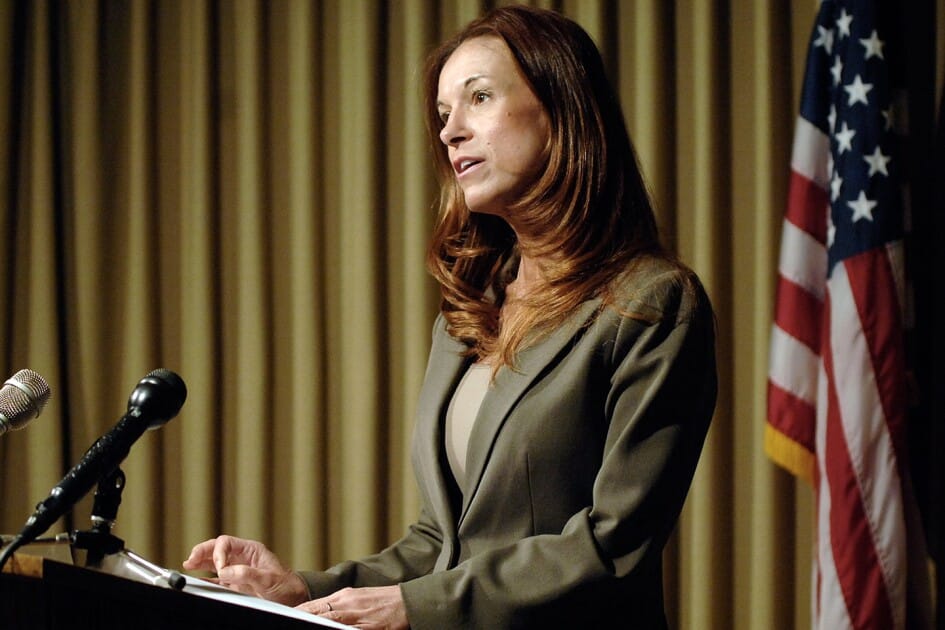Kirsten Baesler, the longtime North Dakota state education chief, cleared a U.S. Senate vote Tuesday to serve in a top leadership role at the U.S. Department of Education.
Baesler will join the department as assistant secretary of elementary and secondary education under Education Secretary Linda McMahon, amid turbulent changes to the federal agency that has seen rapid downsizing during the Trump administration. President Donald Trump tapped Baesler for the post in February.
The division Baesler will lead, the office of elementary and secondary education, oversees some of the federal government’s core K-12 functions, including distribution of Title I funds to states and enforcement of the Every Student Succeeds Act, the primary federal school accountability law.
With a history of working across the political aisle, Baesler is the longest-serving current state education chief. She was first elected to her nonpartisan post in 2012, where she helped her state achieve national status in competency-based instruction and computer science, and she was last reelected in 2024. She also has served as president of the bipartisan Council of Chief State School Officers during her time as North Dakota’s state chief.
Her nomination had cruised through the Senate Health, Education, Labor and Pensions committee without a hearing, and was sent on to the full Senate in May. Since then, it had been among the executive branch nominations that the Senate didn’t approve until it changed its rules to allow the confirmation of several nominees at once with a simple majority vote.
Baesler was one of more than 100 nominees approved Tuesday in a 51-47, party-line vote.
“I am honored, humbled, and incredibly excited to have received this final vote of confidence from the U.S. Senate,” she said in a statement after the vote.
Baesler’s confirmation coincides with the first government shutdown in seven years, during which most of the Education Department’s workforce is furloughed and newly confirmed nominees can’t be sworn in. That workforce has also shrunk considerably since President Donald Trump took office in January, as he has aggressively worked toward his campaign promise to abolish the 45-year-old federal agency and disseminate its vast portfolio to other agencies.
It’s a vision Baesler herself has carried out at the state level. Last year, Beasler authored an opinion piece about cutting staff at North Dakota’s department of public instruction, and moving mental health services to another agency, outlining how it could serve as a model for the federal government.
She also suggested moving some of the federal Education Department’s functions, like civil rights enforcement and student loans, to other Cabinet-level agencies, mirroring suggestions made in the conservative policy agenda Project 2025. The Trump administration has already begun implementing several Project 2025 proposals, particularly in K-12 education.
Baesler’s appointment comes after the department’s presumptive No. 2, former state education chief and educator Penny Schwinn, dropped her bid to serve in the agency after some conservative lawmakers chafed at her past comments on gender and race in classrooms. The administration hasn’t yet announced a new appointee. Schwinn is serving as a senior adviser and chief strategist in the department—a post that doesn’t require Senate confirmation.
Alongside Baesler, Kimberly Richey, who will oversee the agency’s office for civil rights, was also confirmed Tuesday. The office has, in recent months, become a strict enforcer of the president’s public policy agenda in K-12 schools and colleges and universities.
Craig Trainor—who has been leading the office for civil rights since the start of the Trump administration in an interim capacity and has been a main actor in enforcing the administration’s efforts to eradicate diversity, equity, and inclusion programs—was confirmed to be an assistant secretary at the U.S. Department of Housing and Urban Development in Tuesday’s vote.
2025-10-08 00:41:41
Source link

